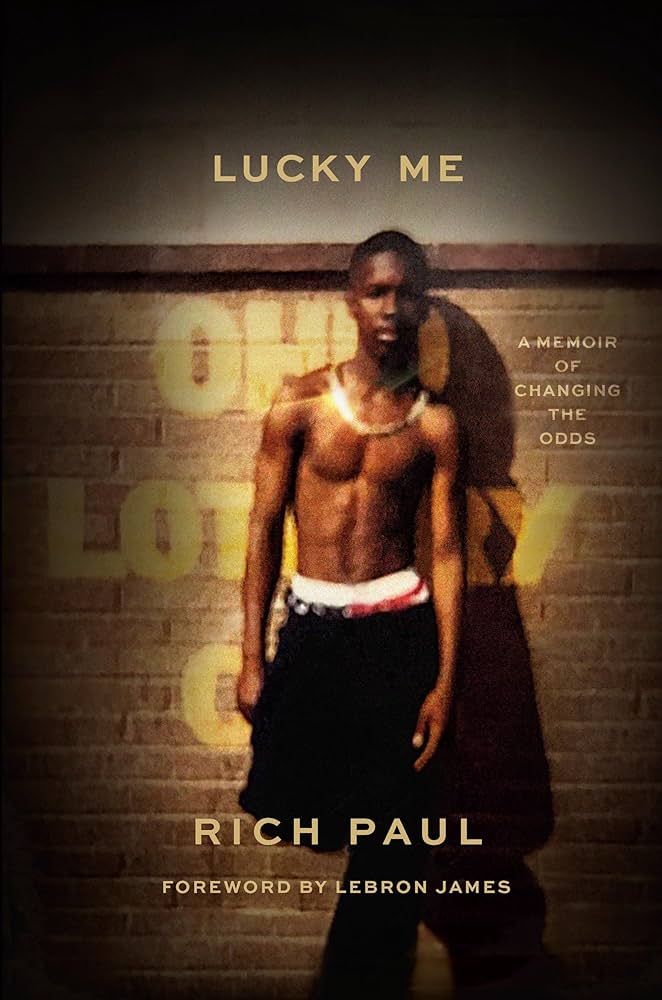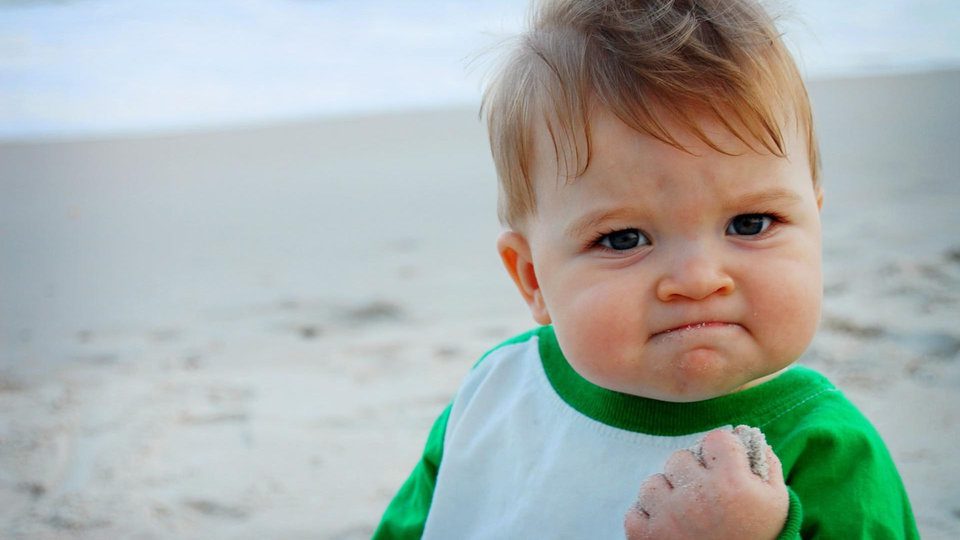In Lucky Me: A Memoir of Changing the Odds, American sports agent and founder of Klutch Sports Group Rich Paul shares the role luck played in him becoming one of the most successful sports agents, considering his background. He writes about his relationship with NBA superstar Lebron James and the lessons he has learned from being a student of life and the streets. Rich writes about his early upbringing, his mother’s drug addiction, lessons learned from his father, and the most important insights that he garnered from the streets.
Rich went from gambling to selling weed, drugs, and selling jerseys. He met Lebron James in 2001 at the airport, fascinated by the jersey Rich was putting on, Lebron asked “What kind of jersey is that?“. Rich was wearing a Warren Moon Houston Oilers throwback Jersey. The rest, they say, is history.
Luck is a complicated thing. We live surrounded by luck, if we know how to recognize it. Bad luck can seem good for a while; good luck might be hard to understand.
Book Title: Lucky Me
One of my all-time favourite Jay-Z songs is a deep cut called “Lucky Me.” Jay is talking about how success brings envy, jealousy, and danger and about how people think his life is perfect, but he’s dealing with more than they could ever know. It’s a powerful, mournful, and somewhat sarcastic song, with a hook that goes: You only know what you see / You don’t understand what it takes to be me.
“My first stroke of luck was being born into a life that forced me to be focused and prepared. Luck was learning how to recognize friendship, loyalty, love, and justice, and how to cultivate those values in life and business. Learning how to confront systems of power and not flinch, to walk on a razor’s edge and never fall. Most importantly, I was lucky to learn from real Gs how to have a purpose and mission that can make a difference in people’s lives, and that maybe, someday, can change the world.”
Lebron James on Rich Paul
A young Black man can be a lot of things with no judgment from his community—athlete, student, hustler, rapper, father—but what he cannot be is vulnerable. When I met Rich, he saw me as just a kid from Akron, Ohio. He knew that even though the LeBron James thing was starting, I had the same fears and dreams as every other young person who grew up the way we did. It didn’t take long for me to realize that Rich is great at paying attention: to people, to the different environments that we move in, to why we feel how we feel. Rich sees things deeply. When Rich looked at me, I didn’t have to hide anything. The world was coming at me so fast when I was a teenager, and not just basketball. My first son, Bronny, was on the way. I had no dad and no siblings. My mom was struggling. Rich helped me find my strength in that chaos, a chaos that he knew all too well. Rich never asked me for anything. He didn’t care whether I was a future pro or the kid across the street. He just knew I needed his help, and he gave me what I needed most—the space to be vulnerable.
Rich is great at paying attention: to people, to the different environments that we move in, to why we feel how we feel. Rich sees things deeply. When Rich looked at me, I didn’t have to hide anything.
Luck
Some people say I’m lucky, and in one sense they’re right. At age twenty-two, I had a random encounter with a teenager named LeBron James that changed my life. But luck is a complicated thing. We live surrounded by luck, if we know how to recognize it. Bad luck can seem good for a while; good luck might be hard to understand. My luck often arrived in disguise. It might look like a father pulling a gun on his son, or an absent mother who needed forgiveness and compassion. It might be the terrible luck of fast money or the surprising luck of a dog that doesn’t bark when your life is on the line.
Luck is a complicated thing. We live surrounded by luck, if we know how to recognize it. Bad luck can seem good for a while; good luck might be hard to understand.
No “I Love Yous”
We felt love but didn’t get many “I love yous” growing up. Mom was consumed with fighting her problems, and Dad’s love came in the form of discipline, pushing, reprimanding, attention, and expectation. Dad didn’t feel he could broadcast his love in ways that hinted at his own vulnerability, because that could get you killed in our neighborhood. He was preparing us to survive in an unforgiving environment.
“No “I love yous” is a lesson I carry today, even in business—I know that words and cheap sentiment have no value. I don’t expect anything from anybody. I don’t expect other agents or the media to praise me, I don’t expect professional sports teams to care about me or my guys.
Even when it comes to my clients, as much as I love my guys, the main way I care for them is by telling them the truth. This doesn’t always go down easily—most pro athletes are surrounded by people who tell them every day how great they are. Some athletes get tired of hearing me tell them the truth. At some point, they buck. But it’s the only way I know to show real care—by paying attention and telling the truth. In the end, it’s the only kind of love that matters.
Who is a Hustler?
In popular street terminology, “hustler” usually means drug dealer. My definition is a little more expansive. I define a hustler as someone who is never complacent, always thinking two steps ahead of everyone else. Someone who can manage the transitions. If things turn upside down, a hustler adapts to being upside down without missing a step. They never get stuck in a situation, and always understand what move to make in order to accomplish their goals. Both of my parents were hustlers, and that’s where my education began. It’s a real-world education that comes with a lot of risk, and not every hustler succeeds, that’s for sure, but I wouldn’t be where I am today without it.
A Hustler as someone who is never complacent, always thinking two steps ahead of everyone else. Someone who can manage the transitions.
Lessons from his Dad – Rule: Live Nothing to chance
- The hand is quicker than the eye. Guys can deal from the bottom of the deck and you’ll never know. Be careful. Know the robbers, know the jackers, know the schemers.
- Don’t pull out a roll of money in front of people. Peel off what you need and only let them see that. Understand that the closest person to you will knock your head off for that roll. And never cheat,” my father told me. “Because that will get you killed.”
Rule Iron Your Clothes
Attention to detail still defines my life. When you practice doing little things the right way, it helps the big things fall into place.
Numbing the Pain
Over the years, I’ve heard a lot of negative comments from outside our community about how poor Black people spend so much money on sneakers or the latest iPhone. Here’s what they don’t understand: When I was a kid, everything felt surface-deep in my life. There was nothing to get to the bottom of. We were conditioned to think that getting and spending money defined success. Today, I hear people talk about “getting the bag.” Very few people talk about building something that provides the bag. I tell the athletes and other young people I mentor to use their resources to find opportunities to build something, to believe in it, bet on it, and do everything they can to add value. The rest will come. But all of that was beyond me as a kid. When you live in an environment that’s liable to spin out of control at any moment, a fresh pair of sneakers and a sharply pressed outfit will hold you down.
We were conditioned to think that getting and spending money defined success.
Rule: Discipline Your Approach
It’s hard to understand that even in the game there are differences in how you approach it. There are ways to maintain some control and minimize harm, even if just for a little while, and ways that are sloppy, careless, and lead to quick and unnecessary suffering. It sounds obvious but it’s easy to forget: Having a disciplined and thoughtful approach to your work day in and day out, especially when the work is difficult and risky, will determine your level of success.
“Every day you wake up and bring yourself to the world in an undisciplined and thoughtless way is a day you put yourself closer to failure than success.”
RULE: Build an Ecosystem of Empathy.
My dad understood the 360-degree ecosystem of our neighborhood and the need to maintain some kind of balance in that world. He knew that his own success could help another person get ahead, whether that meant being in a position to give someone in need a part-time job or some credit until payday.
Success could be shared. That didn’t mean there weren’t winners and losers—we had a lot of hard-core dice throwers who knew that their victories came out of somebody else’s pocket. But things functioned best when winners won with class, losers maintained their dignity, and there was balance and fairness in the competition.
Don’t feed the ego: A well-fed ego is not, in the end, helpful to the athlete—vanity can ultimately destroy you.
RULE: Move with Intention; Be Ready to Improvise
When the dangers unleashed by the system threaten to spin through our lives like a tornado, we do things a certain way—consciously, purposefully—to avoid being swept away. Ain’t no stumbling your way through life. Black folks don’t have enough margin of error for that. Most of us have no margin of error at all. But even with all that discipline, you still never know what might happen—you have to plan with intent but always be ready to improvise.
“Sometimes in the neighborhood you had to fight fire with fire, meet aggression with aggression. But not always. Survival required constant calibrating and balancing various and sometimes competing factors.
RULE: Never Submit to Your Surroundings.
One reason a lot of people aren’t successful is they’re trying to control everything but what they can control. Putting energy into what somebody else said, spending all day on Instagram worried about what somebody else has, where they are, what they’re doing, who they’re doing it with. You don’t control any of that, and meanwhile your life is as messy as they come. If you put that energy into what you can control, it creates a better outcome. For thirteen-year-old me, controlling what I could control meant matching the accents on my sneakers to the color of a stripe on my Tommy Hilfiger shirt.
More Lessons from Dad
Also, when Dad was my age, he was doing the same things I was doing. That’s why he knew he couldn’t stop my flow; he just wanted to monitor it. “Be careful,” is what he told me. “I’m not going to be here forever. You gotta know where to draw the line. Because if you get in too deep”—and by that he meant selling cocaine, robbing and shooting, and losing control like a lot of young men in our neighborhood were—“there’s only two ways out. Dead or in jail.”
I took his advice. I wasn’t going to leave the streets, but I was going to be as smart as I could be on them, so I strategized and observed. I thought about who to stay away from and who I could trust. I always try to see beyond the surface, to discern the character of people, judge their reliability. I honed that skill as much as I could because it was the only thing that could separate me from everyone else in the game, no matter how street-smart they were. I needed to be smarter. I wasn’t going to quit, so I had to maximize my wits and intuition to survive. And just like Dad said, I needed to know where to draw the line.
“If somebody tries to do something bad to you, it’s not about you, it’s about them.”
You are built for more than you see
Young people only see what’s in front of them, and don’t have an understanding of what’s behind that wall. You can’t even imagine what’s behind that wall. That’s why we have to believe that we are more than what we’re told we are. We have to have faith in that idea, even when we can’t see it yet. All I saw beyond my block was more blocks just like it, more Cleveland. But I couldn’t accept a life of dead ends. I believed I was built for more. We all are.
Trust your Self
You might be thinking, Rich made it out hustling, so can I. I’m telling you, it’s not worth the risk. If things go left, you probably won’t get a second chance. Think about how lucky I had to be. And how lucky am I, really? I lost my mom, my dad, my childhood. I lost my sense of perspective about right and wrong, about what’s truly valuable in life. I lost my innocence.
You can’t rely on luck to make it. Rely on yourself, your effort, your talent, and the knowledge that the journey itself provides what you need to succeed.
All the Best in your quest to get better. Don’t Settle: Live with Passion.



Comments are closed.